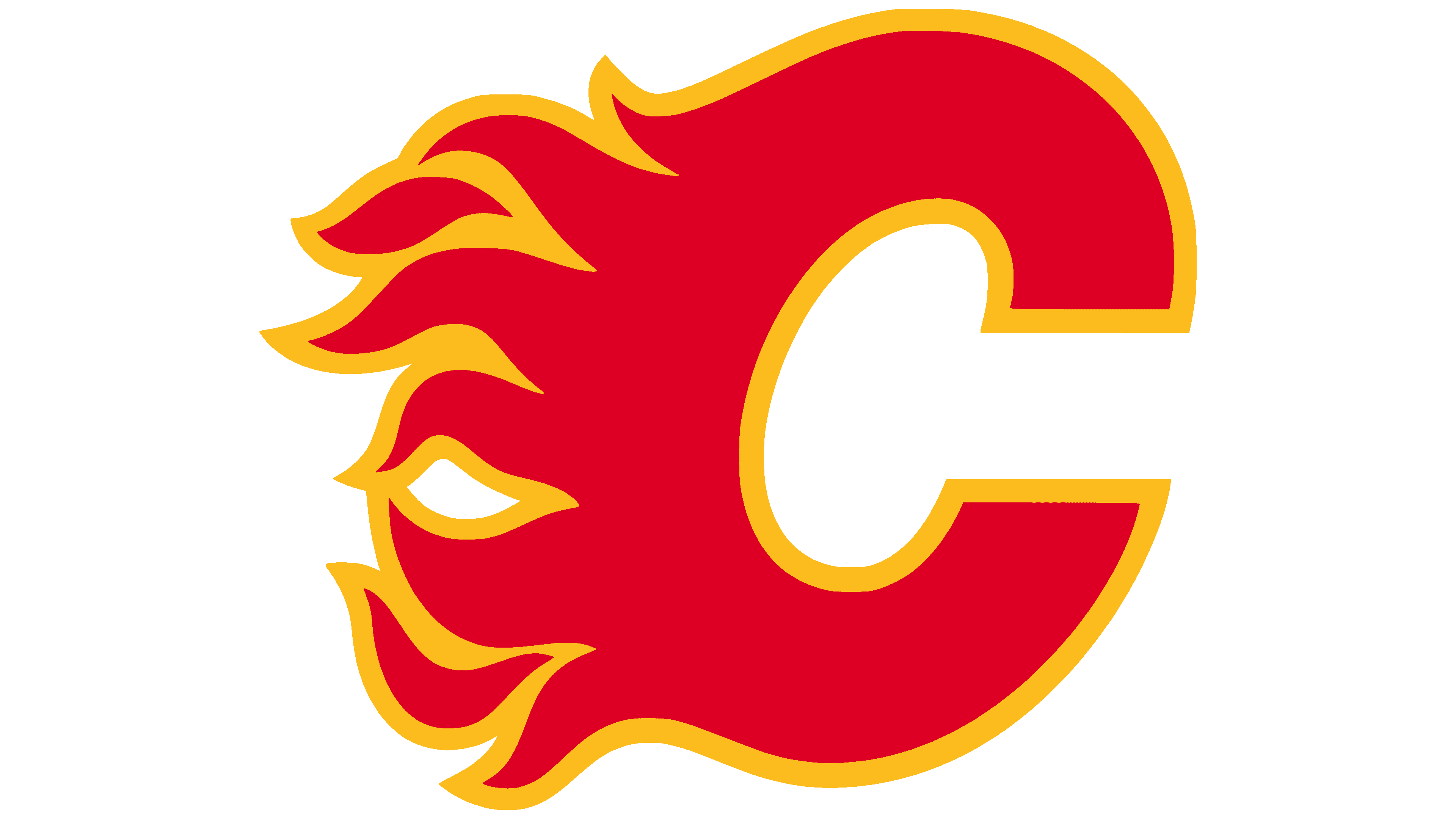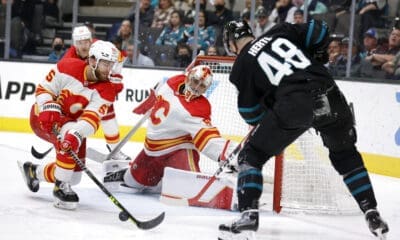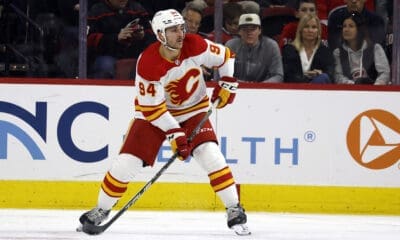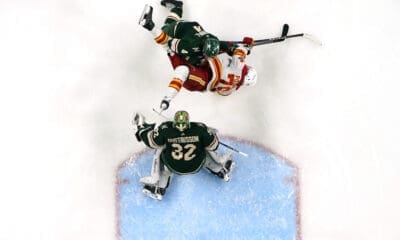Calgary Flames
On Losing, Disappointment, and Becoming a “Real” Hockey Fan

…Crushing disappointment is such an integral part of your relationship with your sports team. The only thing more tied-in to your identity as a sports fan is hope. — Laura, The Active Stick
I’ve been a Flames fan for almost nine years and I think I can safely say that this lockout-shortened season is the worst I’ve experienced so far.
The lockout was hard on us all, and despite the fact that nobody in their right minds expected the Flames to be world-beaters on January 20th 2013, I was over the moon with excitement about getting to see my team play again and all the other great stuff that comes with it after eight months without hockey.
But after 29 games and with 19 left to play, the Flames have narrowly avoided disaster in their unsuccessful attempt to acquire Ryan O'Reilly through an offer sheet, are three games below .500, and caught in a hopeless spiral of win-one-lose-one (or two, or three, or four).
The constant talk of who should be traded where for what, especially when it surrounds players that have been on the team since I became a fan and some of whom are the reason I became a fan, is especially tougher to stomach this year than it has been in the past now that this team is in second-last place in the Western conference, be it legitimately so or not.
The fans hoping for a blowout in every game? Well that’s even worse. Cheering for your team to lose just seems like the antithesis of all sports fandom to me, even though some people may see it as what’s best for the team going forward. I don’t want to see the Flames finish in 10th place in the West, five points out of a playoff spot for the fourth consecutive season more than anyone else, but does that mean I want them to lose every game from here on out and finish 15th in the conference, no matter how often visions of Nathan MacKinnon might dance through my head? No. Beating the Vancouver Canucks like the Flames did three weeks ago somehow feels even better when your team stinks, and as other Flames bloggers more prolific and well-spoken than myself have pointed out, there are other ways to “rebuild.”
I Tweeted about three weeks ago that I would keep cheering for the Flames "out of sheer stubbornness, if nothing else." And it's partially true. When the Flames finally lift the Stanley Cup for the second time in franchise history, whenever that may be, I want to be able to say that I stuck by them through the rough times. Maybe it's because I wasn't a fan of the team during the infamous Young Guns era; I didn't have to endure Craig Button and Doug Risebrough, Rico Fata and Daniel Tkaczuk. I jumped on the Flames' bandwagon in '04, and I got to cheer for playoff teams (however marginal) for the next four years after the lockout. The refrain of "at least we made the playoffs," became my personal mantra until the utter shitstorm that was the final months of the 2008-09 season.
I feel like I haven't experienced enough real suffering as a sports fan yet, and it's almost like a rite of passage en route to calling myself a "real" Flames fan. It builds character. The nine game losing streak that culminated in the Phanuef trade in January 2010 was a good taste of despair, but the ups and downs, multi-goal losses and extended losing streaks sustained over the course of even a shortened season are a whole different ball…er, puck game. An 82-game season usually goes by in a flash, especially for a team like the Flames, for whom it seems that if the season were just 85 games long instead, maybe they would make the playoffs. But this year? It feels like it can't be over soon enough. The losses blur together and the wins bring fleeting moments of happiness that still leave me feeling unsatisfied. The sense of anxiety that used to preface important games is replaced by a feeling of dread, or worse, nothing much at all.
Now, the Flames are near the bottom of the heap in the NHL standings despite not being an abjectly terrible team. They’re the object of a lot of anger and scorn from within their fan base, and the butt of nearly every joke in the Twitterverse from outside of it. Cheering for a losing team is extremely humbling. Sometimes you laugh along, and sometimes you just have to walk away before you lose your cool and someone accuses you of taking the game too seriously, and attacks on your team too personally. In the infamous words of Ilya Bryzgalov, “it’s just a hockey, why you have to be mad?” Anyway, these people are usually fans of perennial playoff teams and/or have otherwise forgotten what it feels like to suffer as a sports fan. I used to be like that because I had never experienced it.
When losses pile up, it’s easy to become sort of numb to the feeling. Expecting your team to lose becomes second-nature, and feelings of rage, shock and disbelief no longer come to the surface when you see them losing 5-1 to the Columbus Blue Jackets. Perhaps this is all part of gaining some degree of maturity as a sports fan. When I first began following the Flames, I was so invested in the team’s successes and failures that my family would avoid me after a loss because I would become so moody and introspective. Allowing a sports team to dictate your happiness is something that tends to ebb away over time. Life goes on. The losses wear you down all the same, but it becomes more of a chronic pain rather than an acute one. That type of pain is still reserved for the particularly gut-punching losses, either the ones that even your lowest possible expectations didn’t see coming, or the ones in which your team miraculously outplays the best team in the league by a mile and still manages to lose the game, the ones that give you false hope (See Chicago Blackhawks 3, Flames 2 (SO), February 2nd 2013).
But I am still angry. I’m angry that my team hasn’t made the playoffs in what will be coming up to four years. I’m angry that hockey ops has held onto the majority of their best assets past their sell-by date in order to keep putting bums in the seats for the short term. I’m angry at meddling upper management. I’m angry that the clock is ticking on Jarome Iginla’s career, and he likely won’t finish it in a Flames uniform with anything but a pathetic whimper because those in charge have subscribed to a “win now” mentality for nearly a decade and have failed time and time again to build and maintain a sustainably good hockey team through all avenues available to them.
The fact that I only started watching the Flames in the spring of 2004, I've only really seen Jarome Iginla play seven and a quarter seasons over the course of his 16 year career and that he could very possibly be traded in ten day's time breaks my heart.
I’m angry that the team actively seeks out and employs players like Brian McGrattan and allows Cory Sarich and Anton Babchuk to rot in the press box. I’m angry that intangibles like “grit,” “toughness,” “size,” and subjective stats like hitting and blocked shots are thought to be the building blocks of a winning team despite all recent evidence to the contrary, and that the Flames’ lack thereof has led to numerous questionable personnel and roster management decisions, not just this season but in previous ones as well.
I’m not angry because I feel like Alex Tanguay, Jay Bouwmeester, Mike Cammalleri, Jarome Iginla and Miikka Kiprusoff et. al don’t care about winning hockey games. That’s just silly. I’m not angry that the latter two, like everyone else on this planet, are vulnerable to the effects of age and simply aren’t the same calibre of player they once were, even if that was just a year or two ago. I’m not angry that the Flames aren’t losing every game by a score of 6-0 in order to affect drastic change.
Sports fans have to pick their battles, which can be tough when you're cheering for a losing team and everything just sucks all the time. You have a reason to be angry, we all do. The feeling of helplessness that accompanies that anger makes it all worse. But we have reason for hope too. The hope that stems from the fact that the Flames may not really be a last-place team, that there are salvageable pieces to build around (if they opt to stay), and that our suffering could be minimal compared to fans of other teams if the right decisions are made. Hope, even if it seems far off at times, is what always keeps us coming back for more.
And thus is the inherent paradox of being a sports fan.
by Hayley Mutch









